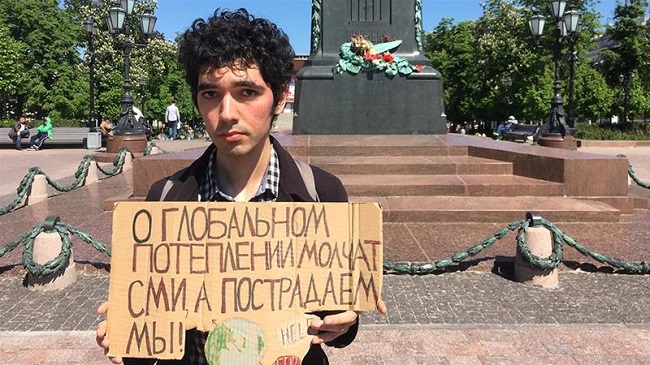Two activists from Fridays For Future were detained in Moscow on Friday, July 17, 2020. As part of a coordinated movement of civil society actions across the globe, they were holding single pickets on Pushkinskaya Square, calling on G20 governments for a truly sustainable, equitable and just recovery from both the Covid-19 pandemic and the climate crisis.

The first to be detained was Arshak Makichyan, who was standing at the monument to Pushkin with a banner “Strike for Climate”. He was taken to the Tverskoy police department, accused of violating the Legislation of the Russian Federation on rallies, meetings, demonstrations, marches and picketing. He was released a few hours later, under the obligation to draw up a protocol under the article, for violating the self-isolation regime.
After that, the police detained Sofya Epifantseva, charged of violating the self-isolation regime and the established procedure “for organising or holding an assembly, rally, demonstration, march or picket.” Under these articles, activists cannot be arrested, but they face fines. They are provided with legal support by the human rights organisation OVD-info and by 350.org in Eastern Europe, the Caucasus and Central Asia.
“These accusations are absurd. According to Russian law, single pickets do not require any approval. Also, on July 9, the Moscow mayor canceled the mandatory wearing of masks on the street. The activists carried out these actions because they are worried about their future, which they may lose due to the climate crisis. Can we really blame them?” said Svitlana Romanko, Managing Director at 350.org EECCA.
“G20 leaders have recently announced their intention to pour $5 trillion into the global economy to recover from the consequences of the pandemic. But we should not forget that ordinary citizens, as taxpayers, are the ones who truly pay for this. Russia on average spends $1 billion 228 million a year to support energy production from fossil fuels, mostly coal, but also oil and gas. At the same time, Russia has all opportunities to be a climate leader and to become climate neutral much earlier than stated in the draft Strategy of Russia’s long-term development with a low level of greenhouse gas emissions by 2050.”
The activities held in many places this week are timed to coincide with the G20 virtual meeting on July 18, when Finance Ministers and Central Bank Governors will be discussing measures to tackle the economic recession caused by the covid-19 pandemic.
